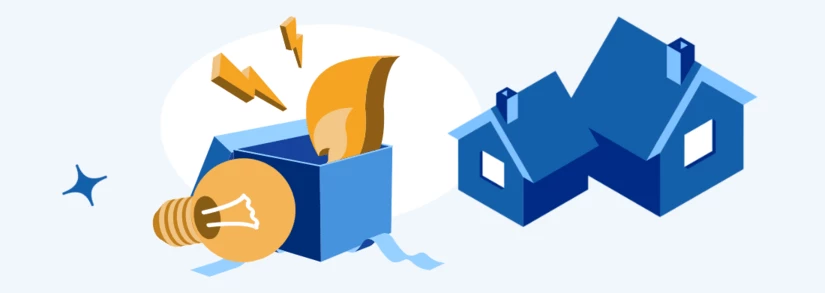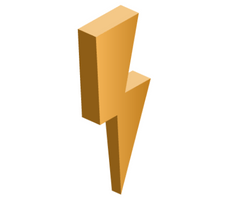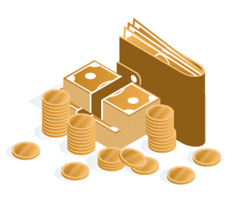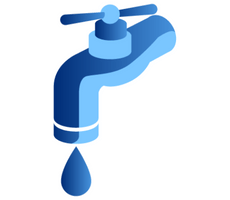New Build Utilities Connections: Your How-to Guide

Call ESB Networks 1800 372 757 to discuss a new build connection! There are a lot of stages to go through when moving into a new build home. Apart from all the headaches and delays in the construction itself, you also need to look after your new home utilities connections. Who should you contact to get gas & electricity connected? How much does it cost? Our complete guide to new build connections answers all of these questions and more.

Moving House? Set up All Your Utilities At Once!
Set up your energy, broadband and waste in one hassle-free call!

Need To Sort Out Your Utilities for Your Move?
We're currently closed but please leave us your number and we'll give you a free call as soon as we're open!
What is included in a new build?

Most solicitors will agree that buying a new build house in Ireland involves a different process than purchasing an existing home.
Buying an existing home is much more straightforward as you see what you buy, and the gas and electricity connections as well as those other essential services like water are also there.
A new build purchase is more involved. Most of the time, the purchase will involve signing two separate contracts; one for the land, and the other for the construction of the residence.
The latter part is where you will want to read the fine print. Contractors will stipulate in this agreement items such as:
- Timeframe of the construction usually ranges from 12 to 24 months to allow for delays.
- Price variation clauses. Often included so that the contractor can increase the home price if the cost of materials increases.
- Key in hand completion or not. This specifies whether the contractor will take care of every single detail so you can just walk in, ready to live in the home, or not.
Moving into a new build home Apart from utility connections, moving in your belongings also requires careful planning. Be sure to look at our moving checklist and tips for assistance with these items.
How to connect your utilities?

If your builder isn't handling the utility connections, you will need to deal with them yourself. We look in detail at the four main utilities for a new build house in Ireland, they are:
- New electricity connection
- New gas connection
- Alternatives energy connection
- Other home utility connections
How do I get my electricity supply connected?
In order to arrange an electricity connection for a new house, you’ll need to apply to ESB Networks.
We look at the two potential different processes below as there are some important differences between the two:
Housing and Apartment Developments
If the house being built is part of a planned estate or development, you can skip the majority of steps needed for detached houses. Normally, the builder will already have applied on your behalf and the price of the new connection is included in the price of the house.
If you have doubts if the ESB new connection is included or not, verify with your solicitor what is included in a new build.
In most cases you will only be left with these four remaining steps to complete:
- You’ll need to ask your builder for the MPRN (Meter Point Reference Number) and MIC (Maximum Import Capacity).
- You can then use your MPRN and MIC to register with one of Ireland’s twelve energy suppliers.
- If your building contractor has already sent the ETCI wiring certificate to the regulatory body, then your supplier will ask ESB to turn on the electricity connection.
- After that, all that’s left is for the electrician assigned to your development to complete the connection.
Which electricity supplier should you choose? You always want to compare electricity prices before choosing an energy supplier. Call our energy experts to make the connection easily at Call 01 903 6556. If you do not select one, Electric Ireland will be assigned to you by default on their standard rates.
Self-build homes with new electricity connections

All electricity connections in Ireland are handled by ESB networks. Each home is assigned what is known as a Meter Point Reference Number (MPRN) so that your electricity consumption is accurately measured and that you only pay for the energy used.
Any new build construction, therefore, needs to obtain a connection to the electricity grid and consequently, its unique MPRN number. You can fill out an application form online and will need to provide the following documentation to receive a quote for your new electricity connection:
A copy of your site plan.
Your architect or contractor should be able to provide you with one. Be sure to request the plans to be on a 1:100 scale for rural buildings and 1:500 for urban. If they cannot provide you with a copy of your site plan, you will need to obtain one from the Ordnance Survey Ireland (OSI).
A copy of the survey map of your property.
Once again, your architect or builder should be able to provide you with this. The scale used for these plans need to be between 1:2500 to 1:10560. Alternatively, the OSI can provide you with a copy for a fee.
GPS coordinates of your home’s location and orientation.
These are usually located on the copy of your survey map. If they aren’t, you can use Google maps to obtain the GPS coordinates.
Load and Connection Capacity.
These are specific details of your ESB new connection. You will need to download their load and capacity details form online.
Submit your application.
Once you have gathered all of the required information, you will need to register for new electricity connections and then submit the ESB new connection form.
You can expect a quote for the new electricity connection in approximately 15 business days. Should accept the quote, please allow for another 60 business days (12 weeks) for the new electricity connection to be completed.
What do GPS coordinates look like? Your home’s Global Positioning System (GPS) coordinates will appear as two numerical values, one for longitude and the other for longitude. There are different formats for GPS coordinates but the decimal degrees (DD) is the most commonly used (51.40338, -8.17403 for example).
How much does it cost to connect electricity to a new build in Ireland?

There are a lot of factors which can affect the cost of a new electricity connection, such as:
- Distance to closest existing electricity lines.
- Whether your dwelling is in a rural or urban area.
A typical standard new electricity connection is close to €3,000 per unit.
Once ESB has received your payment, they will start designing the necessary access route and put the paperwork in motion. It is important to note that ESB will not begin any work until payment is received.
You will then also need to follow the following steps and pay for these required services as well:
- You must get your electrician to send an ETCI wiring certificate to the ETCI regulatory body (Safe Electric or the NSAI for example). Typically, this is done two weeks before you intend to start using your ESB new connection.
- The regulatory body will then get in touch with ESB.
- If your ducting has been completed, and the earth trench and outdoor cabinet are in place, go ahead and notify ESB on 1800 372 757 or 021 238 6555.
- Your connection will then be ready to go live, and your electrical contractor can literally flip the switch.
Did you know?Ireland is one of the few countries that allows newly built houses to choose from any energy supplier. Other countries, such as the UK, restrict choices to a few lucky suppliers. This creates an unhealthy and expensive monopoly for customers.
How do I Get Gas Installed in my House?
Similar to a new electricity connection, if you own a newly constructed house and would like to use natural gas, you’ll need to get in contact with the aptly named “Gas Networks”.
We’d advise you to check first if gas is available to be connected to your particular locality. Do this before installing appliances or making changes to your property.
As with electricity, we examine the following two scenarios for a new gas connection:
How do I check for gas connections in Ireland? You can go online to the gas network map and submit your Eircode or address.
Housing and Apartment Developments
As with electricity connections part of a new build development, the majority of the required steps will already be taken care of for you by the promoter.
You will only need to ask your builder for the GPRN number associated with your home and contact the gas supplier of your choice to arrange a connection.
Self-build homes with new gas connections
If you do it yourself, there will be a lot more steps to get a new gas line connected to your new build home. The steps are as follows:
- Verify if gas is available in your area.
- If gas is available, you can submit an online application for your connection to the gas network.
- During the application process, you will need to accept the terms and conditions, give a meter location, and give your contact information.
Important! The location that you give for the meter must be in line with Gas Networks' meter location guidelines. The route for the service line must be the shortest, most direct route in a straight line to the meter location.
After the above steps are completed, you will be contacted by Gas Networks to complete these next steps to connect a new gas line to your home:
- Agree to the quote received and pay for the installation costs.
- Select an appointment time for gas networks to install the line.
- Once the job has been completed, you will be handed your unique GPRN number.
- From here, you can have your contractor hire an RGI-approved engineer complete the interior work of the house.
- Once that is complete, you will be able to choose a gas supplier of your choice.
- Gas Networks will then fit you a meter in consequence and turn on the gas line. Unlike the line installation, you do not need to be present for the meter installation process.
Where will the gas meter be installed? If your new build is a house, you will normally have your meter in a meter box or cabinet outside your home. If your new home is part of an apartment complex, the building contractor should already have arranged a connection to the gas grid, and your meter will be in a cabinet with the other meters.
How much does it cost to connect gas to a new build in Ireland?

Connecting your house to the gas network certainly won’t cost you the earth but it doesn’t come free either. The amount of money you’ll need to spend will depend on whether you do most of the work yourself (getting the trench for the gas pipe dug) or whether you’d prefer Gas Networks to do the hard labour for you. Gas Networks installation costs are as follows:
- If the length of the connection is less than 15 metres, a flat rate of €249.70 including VAT will be applied. In this case, there is no point in doing the work yourself, as you’ll be paying the same amount anyway.
- If the connection is over 15 metres in length, and Gas Networks does the trenching and connection, you’ll be charged the flat €249.70 rate plus €51.32 per metre over 15 metres.
- Should you prefer to do the trenching work yourself, the final cost will be the flat rate plus €10.97 per metre over 15 metres.
Good to know A new gas connection needs to run perpendicular to the property, if it doesn’t, a gas main extension December be required. In these cases, a visit to the site is usually required before receiving a quote.
Electricity and Gas Suppliers For New Builds
Below you’ll find a list of Irish residential energy suppliers, the energy they supply (electricity or gas), and a quick link to contact options for that supplier. Remember that if you have both gas and electricity connected, then you’ll also have the option of a dual fuel discount on your energy bill. You should also be able to get a discount if you sign up to pay by direct debit.
Always compare different energy suppliers to make sure you get the best tariff for your electricity bill and/or gas bill. If you’d like to start on the best foot in your new household, make sure to check out our guide on energy-saving tips for your home, and remember that switching energy suppliers every 12 months is one of the easiest ways to save.
If you’re interested in getting a smart meter, you don’t have to do so via your energy supplier as ESB Networks will be rolling out smart meters for free over the coming years.
| Supplier | Best Offer | Estimated Annual Bill |
|---|---|---|
.png) | Variable Rate Discount | €1,281.23 |
.png) | 26% off Electricity | €1,282.06 |
.png) | 30% on Standard Electricity | €1,317.20 |
.png) | 29% on Standard Electricity | €1,398.03 |
.png) | 35% off Electricity | €1,406.31 |
.png) | 32% on Standard Electricity | €1,488.76 |
.png) | No Discount | €1,474.51 |
.png) | 29% off Electricity | €1,559.14 |
.png) | No Discount | €1,566.28 |
.png) | No Discount | €1,912.10 |
.png) | No Discount | €2,220.62 |
Call Selectra to Switch Energy Supplier Today! Schedule a Free Call with Selectra! | ||
*Figures are for illustrative purposes only. Calculations based on average consumption figures for an urban home with a standard meter. All discounts and cashback have been applied, including recently announced price increases.
Last updated: October 2025
Alternative Energy Sources
So you’ve bought, or built, the house of your dreams. However, it’s so far away from the energy grids that connecting up gas and electricity is appearing cost-prohibitive. Why not consider alternative energy sources then?
Here are just a few of the alternatives now available on the Irish housing market:
- For electricity purposes, you could consider installing a solar panel system.
- For home heating, a heat pump should be top of your list. Tight guidelines on energy efficiency for newly constructed houses in Ireland mean that a heat pump is an ideal home heating solution.
- Look into SEAI grants available to make energy-efficient choices at a fraction of the cost.
- Explore the option of an independent LPG or oil tank. However, with the general move towards greener energy in Ireland, investigating renewable energy sources first is certainly worthwhile.
Self-sustainable home A big advantage of using renewable sources is that they will provide your home with energy independence. This means you would no longer be at the mercy of fluctuating tariffs, adding to the already expensive Irish energy costs.
Other New Build Utility Connections
Apart from energy connections, there are other essential services you will need to look into when moving into a new build house in Ireland, these are:
How do I Get Water Connected to my House?

For water connections, again, if your home is part of a development, the promoter will be handling this for you.
For self-build homes, depending on where you are in the construction process, you will need to either fill a pre-connection enquiry form or a connection application form from Irish Water (UISCE).
Simply follow their online water and waste connection request form or contact them directly at 1800 278 278, representatives are available 24/7, 365 days of the year.
How do I Get Broadband Connected to my House?
Whether we like to admit it or not, a reliable internet connection has become as essential a service as energy and water.
National Broadband Ireland (NBI) looks after connecting rural areas of the Republic. There is also SIRO which is rolling out high-speed fibre across the country.
You will want to verify if either of these distributors has cabling close to your new dwelling. Otherwise, you December be forced to rely on wireless signals such as 5G. Again, you can verify online where the closest cell towers are to your new build and determine the best option for your internet needs.
How do I Get a Bin Collection Provider to my House?
Did you know that like, the energy market, waste and bin collection is an open market, meaning you can choose a provider of your choice that serves your area?
Have a look at our bin collection companies list or waste guides to see which company serves your home.
